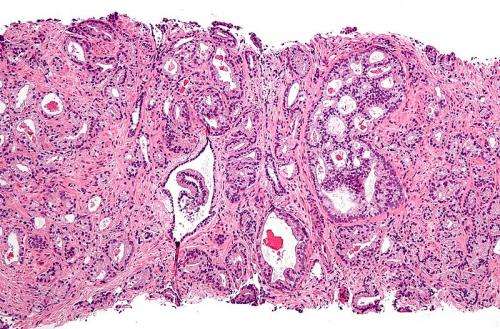Prostate cells undergo 'reprogramming' to form tumors, study finds

Scientists have gained a key insight into how prostate tumors get their start - not by rewriting the normal DNA code, but by reprogramming the master regulator of genes in prostate cells to drive malignant growth.
The findings are a step toward understanding how prostate cancer originates and could open new opportunities for prevention and treatment, according to Dana-Farber Cancer Institute researchers reporting in Nature Genetics.
The researchers, led by Matthew Freedman, MD, and Mark Pomerantz, MD, said they have identified the "first mechanistic insights into a key set of events" that prods normal prostate cells down the road to cancer. It's been a longstanding question, because few gene mutations have been found in prostate tumors. "This led us to wonder, is there another process going on?" said Freedman, of the Dana-Farber Center for Cancer Genome Discovery and Center Functional Cancer Epigenetics.
The investigators spotted evidence of the cellular reprogramming when they compared normal and cancerous prostate cells from several patients. It is termed "epigenetic" because it controls how genes operate but doesn't make permanent changes in their DNA code. The androgen receptor is a protein activated by male hormones that turns on or off sets of genes that control prostate cell growth and other functions. The study demonstrated that this epigenetic program is fundamentally altered during prostate cancer formation.
Because epigenetic reprogramming can potentially be reversed, the authors say it might be possible in the future to use drugs aimed at epigenetic targets to prevent or treat prostate cancer.
"What we have observed is that there is a new epigenetic program occurring as you transition from normal to tumor cells," said Freedman. "Maybe there will be a way to prevent this pattern from emerging, or perhaps we will be able to switch it back to the program being executed in normal cells."
Prostate cancer is the most common cancer in American men - except for skin cancer. About 220,800 new cases are expected in 2015, with about 27,540 deaths, according to the American Cancer Society.
Because the tumors are fueled by testosterone, patients are often given drugs that prevent testosterone from activating the androgen receptor. "The androgen pathway is the central pathway in prostate cancer - it controls everything from the development of cancer to its progression and treatment," explained Freedman.
The androgen receptor is a transcription factor -a protein that latch onto specific DNA sequences in genes, called binding sites, to control how rapidly the DNA information is made into RNA. Transcription factor binding regulates the activity level of genes that operate the cell. The androgen receptor is like a set of keys that fit into thousands of specific locks - the binding sites - situated on the DNA blueprint of every prostate cell.
When the investigators examined the androgen receptor-bound DNA of prostate cancer cells from several patients, they found that the receptor was now binding to a different set of sites, or locks, than in the normal cells. "We observed that the binding pattern in one man's tumor looked a lot more like the pattern in another man's tumor than it did like the pattern in his own normal cells," said Pomerantz, physician at the Genitourinary Cancer Treatment Center at Dana-Farber. The androgen receptor had been reprogrammed to activate or deactivate genes in a way that spurred the prostate cells to grow and spread abnormally.
They also discovered that two other transcription factors, FOXA1 and HOXB13, were critical in driving the androgen receptor reprogramming.
"The marked redistribution of androgen receptor binding sites during tumorogenesis represents one of the most recurrent epigenetic or genetic alterations yet discovered in prostate cancer," the authors wrote.
More information: The androgen receptor cistrome is extensively reprogrammed in human prostate tumorigenesis, DOI: 10.1038/ng.3419
















